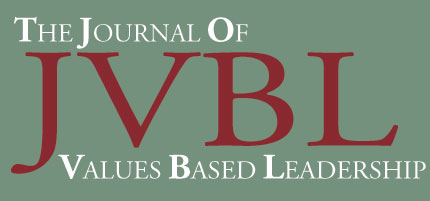- ARTICLE SUMMARIES
Special Acknowledgement
The Journal of Values-Based Leadership (JVBL) is sponsored by Bonnie ('70) and Peter ('65, '70) Raquet and the Raquet Family Foundation.
Employing the Seven Army Values to Win Hearts and Minds
1st Lieutenant Jonn Kusch (San Antonio, Texas), 693rd Engineer Sapper Company, U.S. 7th Engineer Battalion, Fort Drum, New York
When the objectives of warfare focus not only on seeking out the enemy, but by garnering grass-roots support by the local citizenry through personal interaction, this "winning hearts and minds" strategy commands a culturally sensitive and well defined principled leadership ─ a model which could be used by the business community. In this article, Lieutenant Jonn Kusch provides a rare look into the seemingly insurmountable challenges in Afghanistan and identifies certain values employed by his battalion in fulfilling their charges.Commentary: The Business of Warfare: "Winning Hearts and Minds"
Susannah Marie Gingerich-Larson, DePaul University, Chicago, Illinois
Assuming there are business ethics in warfare appears to represent the ultimate irony. There is no doubt that certain business profit from the exploits of war. But when the objectives are reconfigured with the objectives embracing, this is the time when ethical leadership is most in demand.Conflict Resolution: Cultural Understanding Imperative
Livingston S. Tindal, Regent University, School of Leadership Studies, Norfolk, Virginia
Business transactions and other potential incidences of conflict resolution must be met by participants who have transcended the isolating and often arrogant traits of individualism and must expand to embrace the collective — to realize the importance of learning and understanding cultural differences and whatever creates the uniqueness of the individual. This is particularly critical for success in the global marketplace.The Personal Values of School Leaders in Pakistan: A Contextual Model of Regulation and Influence
Sharifullah Baig, Faculty Member, Professional Development Centre North, Institute for Educational Development, Aga Khan University, Pakistan
The author presents a unique comparative case study which explores the types of personal values and the motivational bases for the acquisition of ethical leadership practices in the context of two schools in Pakistan. Baig notes that the data shows that the inherent religious and communal values of one‘s community and social structure constitute strong, motivational factors in cultivating a school and forging relationships with members of the external community.The Character X Factor in Selecting Leaders: Beyond Ethics, Virtues, and Values
Dr. Robert McKenna, MBA, Ph.D., Chair, Dept. of Industrial/Organizational Psychology, Seattle Pacific University; G. Victoria Campbell, M.A., Doctoral Candidate, Industrial/Organizational, Psychology Seattle Pacific University, Washington
Leading with character requires a person to maintain a delicate balance of certain traits and understand the tensions which exist between humility and conviction, reluctance and courage, and vulnerability and integrity. A true leader must look beyond the content of a problem and rather examine the context of his or her individual make-up in relationship to themselves as well as to their surroundings.The Needs of the Stakeholders are the Seeds of Growth for the Organization: Vignettes of Wisdom from G. Narayana
Shashank Shah, Ph.D.(Interviewer/Author), Post-Doctoral Fellow, Department of Management Studies, Faculty of Management & Commerce, Sri Sathya Sai Institute of Higher Learning, Prashanti Nilayam, Anantapur District, Andhra Pradesh, India
A rare interview with a well-regarded leader of commerce in India is presented by the author, Dr. Shashank Shah. The interviewee, Mr. G. Narayana, is Chairman Emeritus of Excel Industries Ltd. (Excel). Mr. Narayana is noted for his ability to positively motivate people through kindness and the integration of spirituality in the workplace. His brand of leadership is characterized by a type of management philosophy that integrates the scientific principles of the West with the profound thought of Indian scriptures.A Model for Implementing a Successful Sustainability Strategy
David B. Brauer, Founder and CEO of Beechers Gelato and Gourmet Coffee, LLC, Family Sustainable Business Consultant, Pittsburgh, Pennsylvania
The process of implementing sustainability within national and international corporate functions requires senior management commitment and a sustainability team which employs the correct leadership knowledge and skills. Additionally, all stakeholders must fully understand, accept, routinely monitor, and participate in the strategy of sustainability. This core business value must also be clearly articulated throughout the organization.Engaged Leadership: New Concept or Evolutionary in Nature?
Edward Woods III, Doctoral Candidate, Western Michigan University School of Public Affairs and Administration, Kalamazoo, Michigan
Mr. Woods provides a critique and a book review of Clint Swindall‘s Engaged Leadership. His accolades relate primarily to Swindell‘s communication of connecting the dynamics of a work environment and the applications of engaged leadership in fable format. He decries, however, the author‘s missed opportunities to further associate engaged leadership to an established theory of management and to use polling data which attempts to ascertain any cost savings associated with engaged leadership.
Leading with character requires a person to maintain a delicate balance of certain traits and understand the tensions which exist between humility and conviction, reluctance and courage, and vulnerability and integrity. A true leader must look beyond the content of a problem and rather examine the context of his or her individual make-up in relationship to themselves as well as to their surroundings.

